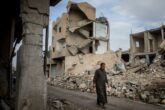September 25, 2018
The Myth of Authoritarian Competence
What trouble in Turkey reveals about the perils of strongman rule
For nearly six months, one of the world’s top economies has been gripped by crisis, sparking fears of wider financial contagion. Since the spring, the Turkish currency has cratered while inflation has soared, rattling other emerging markets from Argentina to Indonesia. Yet the most important warning to draw from Turkey’s recent convulsions is less economic than political: namely, the danger of betting on strongman rule.
In truth, worries about Turkey melting down the global economy are misplaced. Unlike during the Asian financial crisis in the late 1990s, when the collapse of the Thai currency unleashed regional upheaval, Turkey’s problems are less an indicator of systemic weakness across developing economies than the outgrowth of factors that are specific to Ankara. These include a politicized monetary policy, the highest current account deficit among the G20 developing economies, the most foreign-denominated private-sector debt of any emerging market, and a gratuitous fight with Washington that has escalated into sanctions.
Yet while the risk of financial spillover from Turkey has generated a storm of headlines, it is the proliferation of the political model at the root of Ankara’s troubles that is the bigger danger. In fact, in its governance, Turkey under President Recep Tayyip Erdoğan has been at the leading edge of a global trend. Just as a wave of democratization swept the planet beginning in the mid-1970s—overturning dictatorships from Portugal to South Korea and, eventually, the Soviet empire—the past 15 years have witnessed a rising tide of strongman regimes worldwide.
In each of these countries, government power has become highly personalized—overwhelmingly concentrated around a single, larger-than-life ruler who attempts to assert direct control across almost every aspect of state and society. Such leaders and their supporters tend to justify the accumulation of such sweeping authority as the only way to catapult the country forward—the path to national strength and renewal.
Read the full article at The Atlantic
More from CNAS
-
Our Man in Damascus? Sanctions and Governance in Post-Assad Syria
The complexity of the legal and policy issues presented by the sanctions thicket surrounding Syria—and the disparate authorities responsible for various parts of it—will requi...
By Alex Zerden
-
Cryptocurrency in the War Zone: A Closer Look at Recent Events in Syria
Syria’s political fate remains in flux, both internally and in terms of its relations with key regional powers....
By Eitan Danon
-
Syria: What Happened and What Comes Next
After more than a decade of civil war involving major interventions from foreign powers, over the past week a rebel alliance incredibly rapidly gained control of city after ci...
By Richard Fontaine
-
Washington Needs a New Syria Policy Right Now
It is well past time for Washington to demonstrate leadership, advance its global and regional interests, and support the freedom and future of the Syrian people....
By Jonathan Lord




